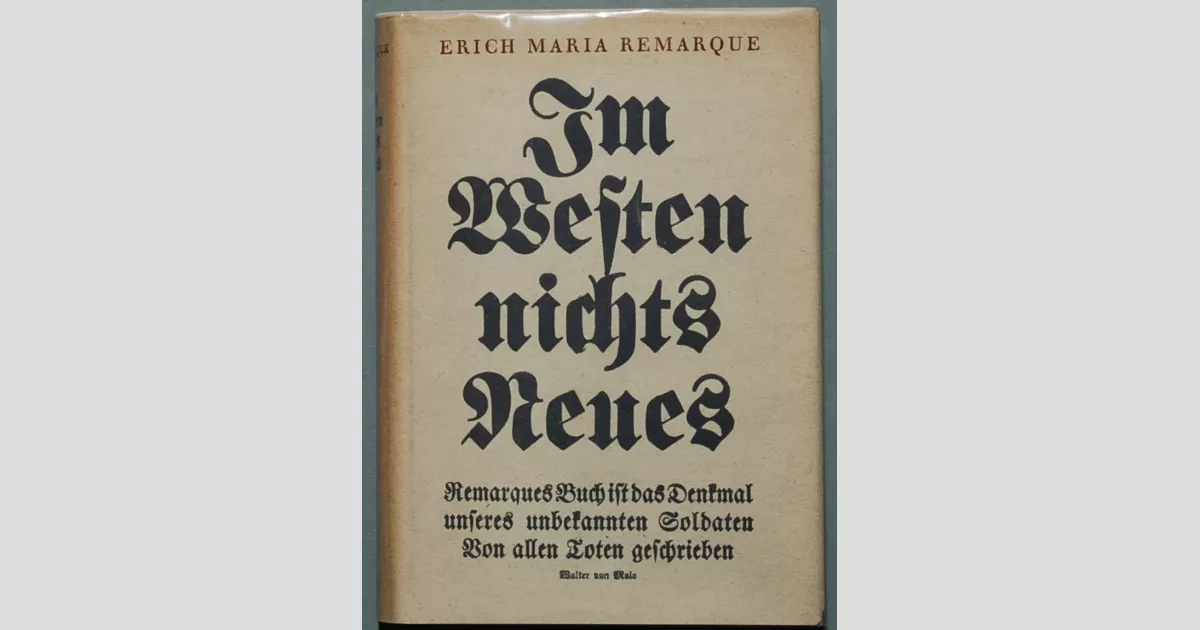All Quiet on the Western Front, by Erich Maria Remarque, portrays the brutal realities of World War I from the perspective of young German soldiers. The novel vividly depicts the intense physical and psychological trauma experienced in the trenches, showcasing the loss of innocence and the profound disillusionment of a generation. It explores the soldiers' struggle to find meaning amidst the carnage and their subsequent alienation from civilian life upon returning home. The book is highly regarded for its unflinching depiction of war's horrors and its powerful anti-war message.
October 1918: Paul's Death
In October 1918, Paul is killed on a peaceful day, and the situation report states: "All quiet on the Western Front."
December 9, 1928: Serial Publication Ends
On December 9, 1928, the serial publication of All Quiet on the Western Front in Vossische Zeitung magazine concluded.
December 1928: Novel Published in Newspaper
In December 1928, All Quiet on the Western Front was first published in the German newspaper Vossische Zeitung.
January 1929: Novel Published in Book Form
In late January 1929, All Quiet on the Western Front was published in book form.
1929: Ban in Austria
In 1929, All Quiet on the Western Front was banned in Austria, and Austrian soldiers were forbidden from reading it.
1929: English Translation by Arthur Wesley Wheen
In 1929, Arthur Wesley Wheen's English translation of "Im Westen nichts Neues" was published as All Quiet on the Western Front.
1930: Nazi Protests Against Film
In 1930, screenings of the Academy Award-winning film based on the book were met with Nazi-organized protests and attacks.
1930: American Adaptation Wins Academy Awards
In 1930, the American film adaptation of All Quiet on the Western Front, directed by Lewis Milestone, won two Academy Awards.
1931: The Road Back Published
In 1931, All Quiet on the Western Front was followed by The Road Back, continuing the story after the Treaty of Versailles.
1933: Banned in Czechoslovakia and Italy
In 1933, All Quiet on the Western Front was banned in Czechoslovakia and Italy, and deemed counterproductive to German rearmament.
1933: Concerns about Stereotypes
In 1933, Dr. Karl Kroner voiced concerns that the book would perpetuate negative stereotypes about German medical personnel abroad, which had subsided since World War I.
1933: Book Burning by Nazis
In 1933, after the Nazis rose to power, All Quiet on the Western Front was one of the first books to be publicly burned.
1936: Three Comrades Published
In 1936, Three Comrades was released and set well into the post-war era.
1979: British-American Adaptation Wins Awards
In 1979, the British-American television film adaptation of All Quiet on the Western Front, directed by Delbert Mann, won a Golden Globe Award and an Emmy Award.
1993: Brian Murdoch's Translation
In 1993, Brian Murdoch's translation rendered the phrase as "there was nothing new to report on the Western Front" within the narrative. He retained the original title.
2022: German Adaptation Wins Academy Awards
In 2022, the German film adaptation of All Quiet on the Western Front, directed by Edward Berger, won four Academy Awards.
2024: Original Book Enters Public Domain
In 2024, the original book, All Quiet on the Western Front, entered the public domain in the United States.
2025: First English Translation Enters Public Domain
In 2025, the first English translation of All Quiet on the Western Front entered the public domain in the United States.
2026: 1930 Film Adaptation Enters Public Domain
In 2026, the 1930 film adaptation of All Quiet on the Western Front is set to enter the public domain in the United States.
Trending

34 minutes ago Jafar Panahi faces restrictions, continues filmmaking despite adversity and imprisonment in Iran.

34 minutes ago Joe Rogan Interviews RFK Jr. on Trump's ICE Raids and US Taxpayer Losses.

34 minutes ago Joki? Confronts Dort After Trip, Tempers Flare in Nuggets-Thunder Game

34 minutes ago Arizona Dominates Kansas to Secure Share of Big 12 Title in Basketball Game

35 minutes ago Gui Santos Secures 3-Year, $15M Deal with Warriors; Curry Issues Warning

35 minutes ago Kawhi Leonard potentially playing vs Pelicans; Zach Lowe praises All-NBA caliber.
Popular

Jesse Jackson is an American civil rights activist politician and...

Hillary Diane Rodham Clinton is a prominent American politician lawyer...

Jim Carrey is a Canadian-American actor and comedian celebrated for...

XXXTentacion born Jahseh Dwayne Ricardo Onfroy was a controversial yet...

Kashyap Pramod Patel is an American lawyer who became the...

Michael Joseph Jackson the King of Pop was a highly...


